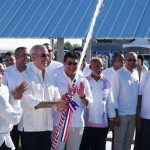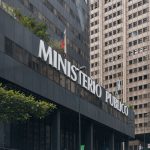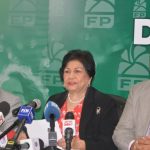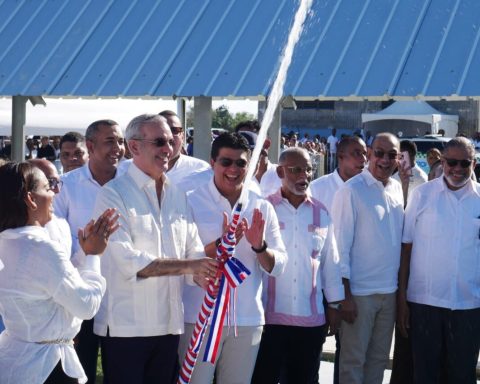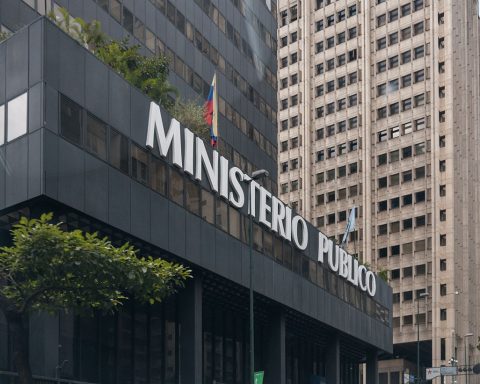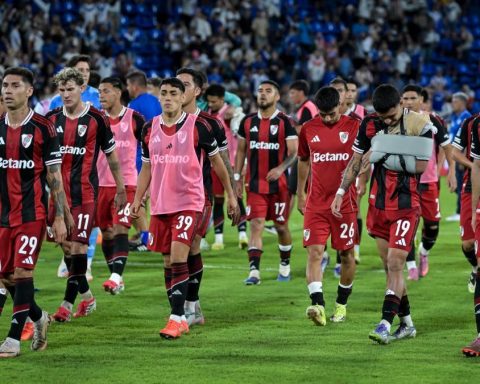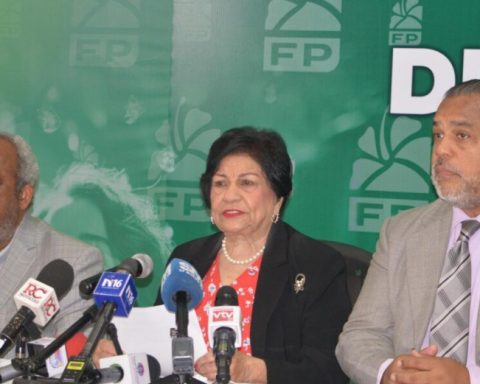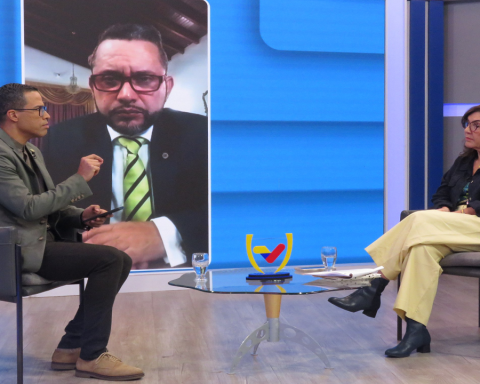August 5, 2024, 7:00 AM
August 5, 2024, 7:00 AM
The issue of fuel in Bolivia and the measures that can be incorporated for a better distribution of fuel in the nine departments of the country, was one of the topics that the Minister of Hydrocarbons and Energy, Franklin Molina, discussed with EL DEBER. He also highlighted some projects that are planned for energy generation.
– Yacimientos Petrolíferos Fiscales Bolivianos (YPFB) produces 5,000 barrels of diesel per day and 11,000 bbl per day of gasoline. Why don’t they supply even moderately?
At the national level, today, due to the decline in liquid production, approximately Our refineries have a supply of 15% of the total supply on average at the national level of fuel demand. This supply has been delivered during these difficult days, mainly because that 85% that pressures demand also has to be in other sectors.
During the days of this supply crisis, a controlled supply plan was first drawn up with the aim of ensuring that all sectors, mainly those involved in public transport and services, would not come to a standstill.
Obviously, in the face of this difficulty, there has been a difficulty, which has not only been posed to us by the logistical issue, but also in the context of an international context.
The combination of factors including weather conditions, market effects, and even the effects of what is happening in the Middle East and Europe, have disrupted these supply chains.
– What would be the current status of payments to fuel suppliers?
This is a report that YPFB has to give. It is the company responsible for doing exactly that management, not only of the contracts, but also of the follow-up of the payments of the suppliers. I understand that today YPFB has a bidding mechanism, and it is they who have to report this situation.
– What plans do you have to improve the logistics of importing and distributing fuels, considering the recent climate and infrastructure problems?
In terms of storage (of fuel), Bolivia should have foreseen this issue of difficulty, because a large part of the fuel comes mainly by sea from the various refineries around the world. Therefore, it was important to have storage plants near or in the ports.
Bolivia has a storage plant in Arica (Chile). We are increasing storage capacity there, which will allow us to have two or three storage tanks.
We are also working on the reversal of the Sica Sica – Arica oil pipeline. Through this reversal we will be able to import diesel, gasoline and crude oil, and even maximize oil imports due to their lower cost and greater product yield, but it will also allow us to set up a scheme to guarantee the problems of blockages.
We are also working on diversifying import points, such as Argentina, Brazil, Chile, Paraguay and Peru. We are expanding our portfolio of suppliers and diversifying our means of import, not only with tankers, but also with ships, barges, trains and pipeline transport.
Investments are also being made in the Paraguay-Paraná waterway, and storage facilities are being established at strategic points outside the country.
– What strategies are being implemented to diversify fuel supply sources and reduce dependence on imports?
This is the policy for biofuels. This is a national policy. We have decree 5135 that allows the mixture of biodiesel and anhydrous up to 25%. We also have mixtures of alcohol, anhydrous and ethanol up to 85%, in addition to incentives for the marketing of vehicles with FlexFuel technology.
We have a series of ministerial resolutions that we have issued during this administration, approving, for example, not only the regulations, but also the issue of the operation of biodiesel plants. We are working to incorporate the private sector into biodiesel production as well. for the supply of the domestic market, but additionally we also have a draft law in the Assembly, a proposal to modify Law 1098, which will allow the diversification of raw materials and production of biofuels and private investment.
That is part of the effort we have been working on in terms of policy. And I repeat, in terms of plants, we have a program for the three biodiesel plants that will allow us to save millions per year.
So there are a series of actions that we are working on, which are the actions that must also be taken to this end. The other thing has to be maximizing crude oil imports due to its lower cost and greater production of products, I am referring to gasoline, diesel, fats and oil, and greater production of plant-based additives to replace liquid fuels, which are in short supply.
– What investments are being planned to perhaps modernize refineries and fuel storage plants in Bolivia? And is there collaboration with the private sector or international financing?
We are working on a proposal. President Luis Arce launched this challenge to increase the volume required for biodiesel production. What will that mean? That we will have, for example, mini plants so that we can produce biodiesel, including not only the crude oil that YPFB requires today, but also biodiesel of private origin.
We are in meetings even with the private sector precisely to encourage this production. We believe that This will not only expand the agricultural frontier Because it is not only biodiesel, it produces food in the case of soybean oils and also generates foreign currency, which is what the country needs.
What we are really going to look for is the incentive of projects that allow us to reduce the large gap that exists on the one hand in the production of the refinery, the issue of the incorporation of imported crude oil, but also the production of biodiesel plants, which will have a multiplying effect on the generation of jobs, the multiplication of activities, and even the development of services that are important.
– What initiatives is the Government promoting to encourage the use of alternative and renewable energy?
We are in the framework of an expansion plan for the electricity sector that is part of the 2050 energy strategy that was socialized in the framework of a forum about a month ago. Under this, we are implementing the regulations that modify a decree that we issued in 2021 for distributed generation.
And in that framework Regulations have been issued that expand alternative generation capabilities so that, for example, private companies, municipalities, mayors, in short, even any person can inject that generation into the network and not only be self-sufficient, but also generate income.
Now, as part of the policy and projects, we have several that we are implementing. With renewable energy sources, beyond the hydroelectric projects that are being implemented, we are also working on an additional significant capacity of wind and photovoltaic projects.
We have a second phase of expansion in Santa Cruz, in everything that the addition of these 108 megawatts entailed.
We have projects executed with funding from the French Development Agency, AFD, and in this way we are also in the framework of management and execution of investment projects in the western region, which is where there is the greatest potential for photovoltaic sources. We are referring to the projects in Oruro and La Paz, which are currently implementing this type of photovoltaic projects to diversify the sources of the electrical matrix.
– How is the fuel shortage affecting the Bolivian economy and what measures are being taken to mitigate these effects in critical sectors such as perhaps transport or agriculture?
The issue of subsidy costs, which have been increasing year after year in the country, clearly also has an impact on the national economy.
YPFB is managing a supply plan, but the focus also has to do with a series of actions, a series of policies that we are currently implementing. These policies will certainly not be possible if there is no will on the part of the various organs of the State.
When I refer to bodies, I am not only referring to the Executive branch. It should be understood that the participation of the Legislative branch is also important for the approval of regulations, such as the modification of the law to have a new biofuels law and to have the approval of contracts that allow us to increase production, in addition to regulations that help us to better monitor border control of imported fuels.
– What emergency measures are being put in place to ensure immediate fuel supplies while implementing long-term solutions?
We have had to activate the authorization in the port of Arica for the supply of fuel. This authorization had a logic, it was to dispatch the four ships that were practically arriving day after day at the port and could not be unloaded. Given this situation, we have had discussions at the highest level.
President Arce even spoke personally with President Boric (Chile) precisely to make this unloading feasible and so that it can be not only at the Arica terminal, but also to enable other points in parallel to do the unloading because these four ships had two with diesel, one with gasoline and the other was with crude oil.
We have also contacted Brazil to discuss the issue of supply through Petrobras, which is something new that we have been working on with YPFB, but also with other entities to ensure that we have this immediate response quickly, which is what the population really requires.
We have also had a political reaction from some sectors that do not understand the purpose of this type of mobilization and self-blockade.
– What concrete steps is the ministry taking to foster dialogue between the different political factions and the affected sectors?
We have been talking with the private sector, we have had various meetings within the framework of this dialogue. Fortunately The measures have been lifted and these blockades have been suspended. as in the case of Oruro, which had about 17 tankers in a single point that could not even go to the service stations to transport the product, or in other cases that do not allow free transit that would also guarantee fuel logistics.
– Is there a risk of food supply due to a fuel shortage? Or is the government affected by a lack of dollars to import?
Well, the country is experiencing this issue of dollars and logically this creates a problem throughout the chain. The fuel issue is undoubtedly a driving force for all productive activity. It is important to mention that As long as fuel can reach the points of demand, the different economic sectors are logically guaranteed not only the supply, but the different activities.
The adverse situation experienced during the previous week has already been overcome. We hope that during the next few days, if we are faced with some blockages, we will return to normality.






